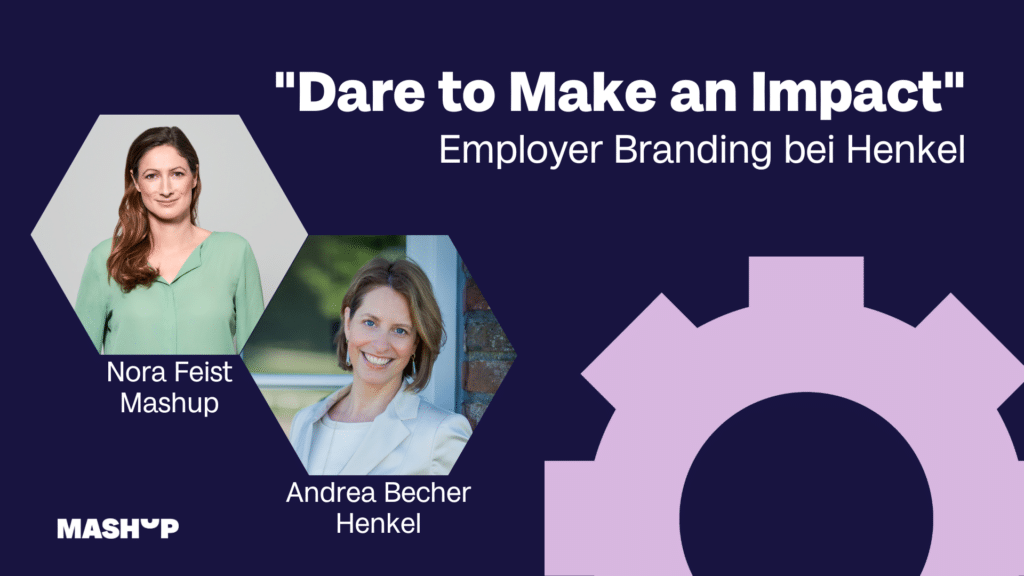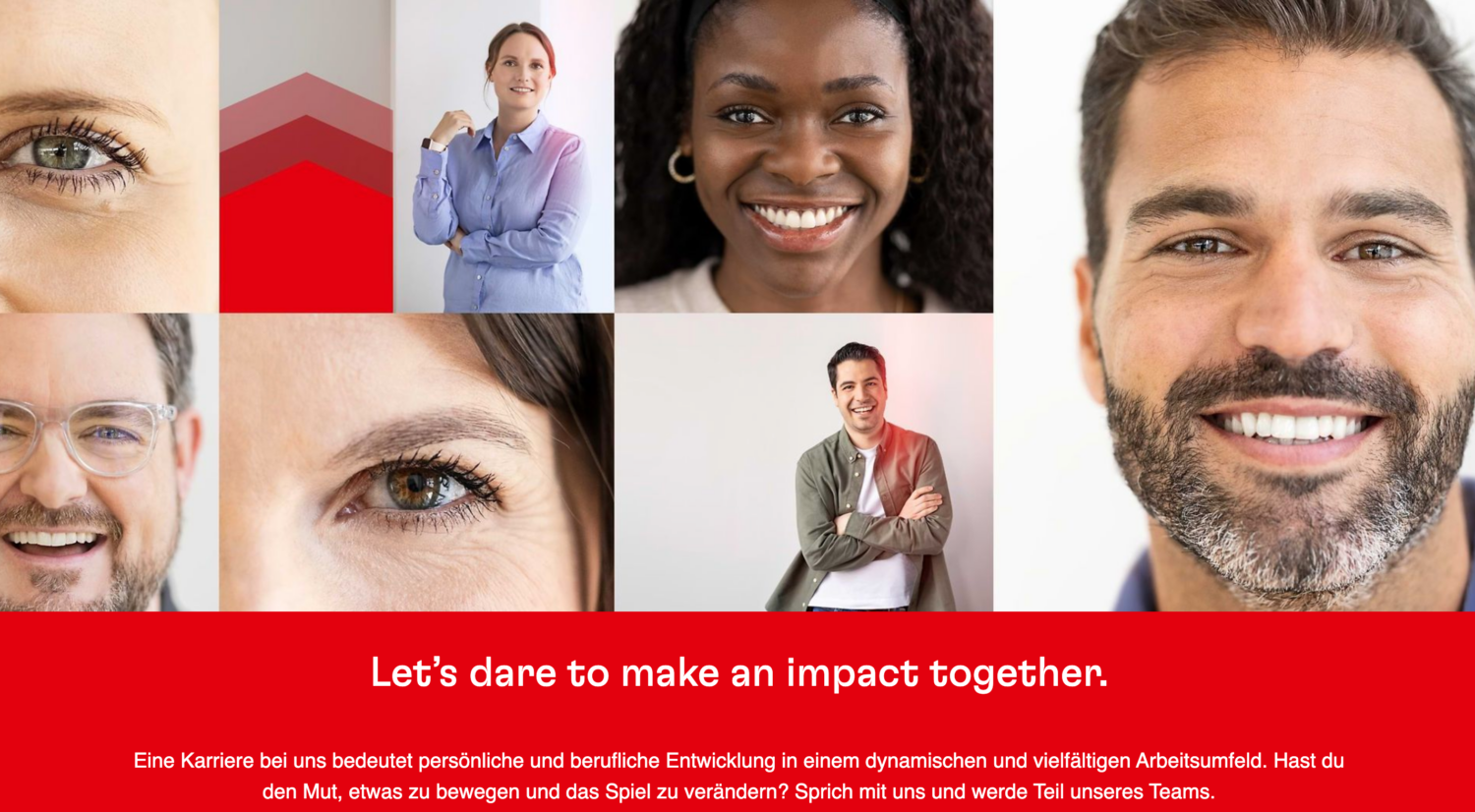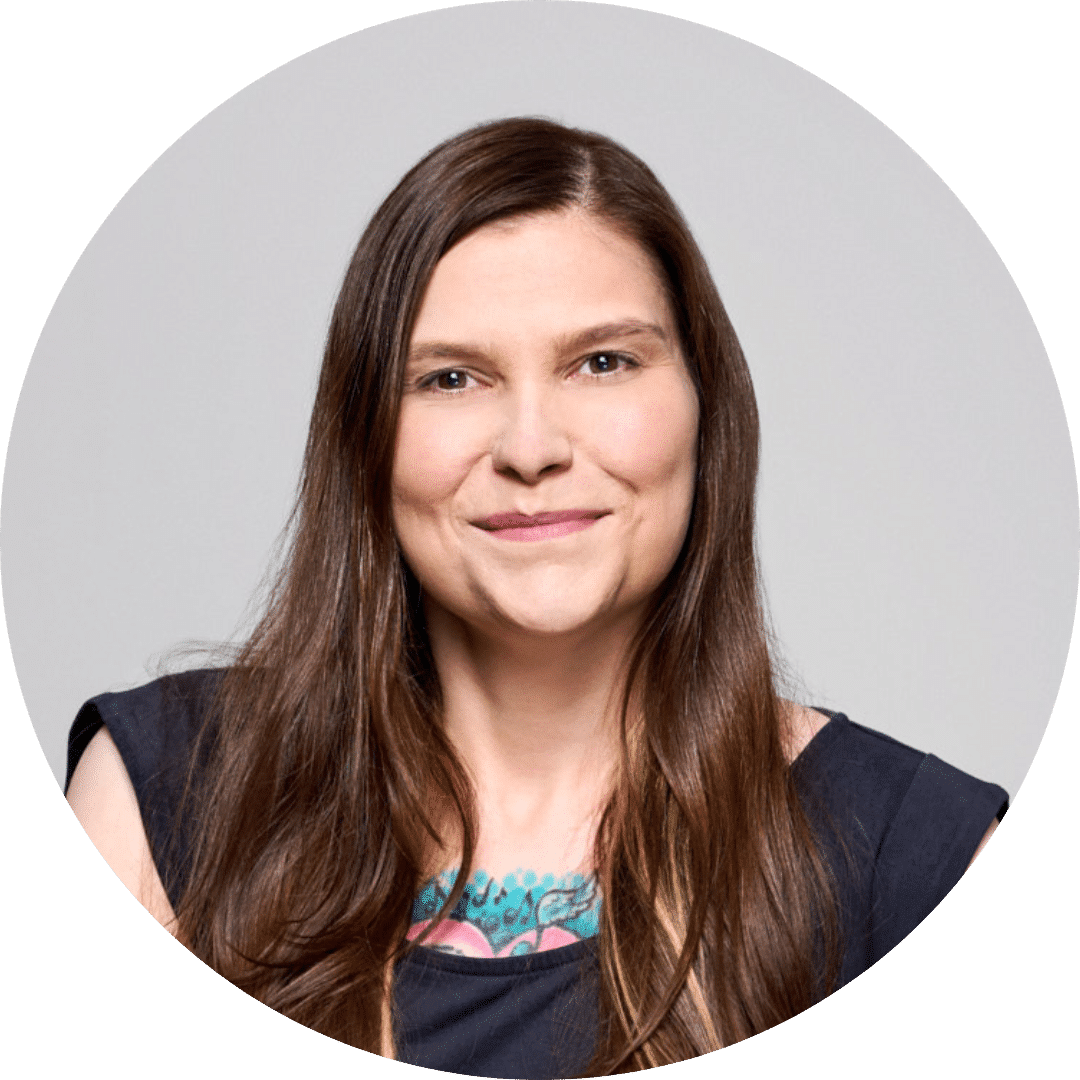Globales Storytelling: Employer Branding bei Henkel

Klicken Sie auf den unteren Button, um den Inhalt von praxis-talk-brand-storytelling.podigee.io zu laden.
Nora: Welcome to a new episode of Praxis Talk Brand Storytelling, this time on the topic of storytelling on career sites. Today I am talking to Andrea Becher, who holds the position of Head of Employer Reputation, Recruitment and Corporate Citizenship at Henkel. A long, long title. Hello, Andrea. It’s great that you’re here.
Andrea: Yes, thank you very much. Thank you for letting me be here.
Nora:Andrea, last year you relaunched your employer communication with Henkel and launched a global career ladder as well as a digital employer branding campaign. But before we talk about that, we would like to find out more about you. Andrea, you have been working at Henkel for about six years. How did this happen? How was the start? And what motivated you to stay?
Andrea:Six years, you said it. This again shows how time flies. Before working at Henkel, I worked for a global communications agency, advised many DAX and medium-sized companies and discovered a passion for all these change topics and management teams early on, but also for the industrial business.

Then, as it happens, the headhunter called and the Head of Technologies Communication position suited me very well. Because I was actually responsible for the communication of – you could say – half of the Henkel company, namely the adhesives technology division and its communication. Together with my team, I have been able to accompany great change processes, but I have also done classic internal and external communication.
Then maybe it was time for a change after four years. It quickly became clear to me: within Henkel, because it’s a wonderful variant. It’s a wonderful employer where you can actually change jobs easily within the company and still have the feeling that you can make a difference. And that’s where the position you just described so extensively came in handy. There are actually three areas that I am now responsible for and all three are super exciting and great. And today we are talking about one of these areas: Employer Reputation.
“Dare to make an impact” is more than just an appeal
Nora:You have launched an employer branding campaign with the beautiful claim “Dare to make an impact”. Tell us, what’s it all about? How did this idea come about in the first place? What was the idea process behind it, the motivation?
Andrea: Perhaps it’s easiest to start with what it actually stands for, the “Dare to make an impact”. Strictly speaking, it’s actually a question, because we ask candidates, but of course also today’s employees, whether they “Dare to make an impact”. And what does it mean?
Well, “to make an impact” may still be fairly self-explanatory in the sense that we all just want to make an impact.
Of course, when we go to work, we want it to have an impact, we want it to make a difference.
We chose this not only because it seems to be modern, but also based on many surveys that we have conducted internally. That this is really the common denominator of the Henkel people at the moment, so to speak, that they have really said: This is what motivates us.
As I said, the fact that it is obviously also an important driver externally has led us to ask “to make an impact” at the end. Daring”, there’s not really a cool word for it in German, because it’s such a mix. “Daring” naturally means having the courage to try something new, but also having the courage to perhaps take risks. At the same time, it’s also about sticking to the topics you’re passionate about and, of course, looking at the whole thing through a commercial lens.
It’s this entrepreneurial spirit that’s always going around as a new German word for driving ideas forward with entrepreneurial spirit. And all of this is in this “daring”. And we just ask: Do you have all this while you want to make an impact? And if so, then you will fit in with Henkel. After all, it is always a question of cultural fit.
Andrea: That was the explanation, so to speak, as to why we decided on this question. The process was actually – I’ll just say it like it should be done. Of course, you start with those for whom you want to be attractive. In the sense that we really asked ourselves: What do we stand for internally, what is important to our employees? But of course also: What are the things that interest potential candidates about an employer?
Of course, we have already evaluated a lot of data for ourselves. Quite frankly, we have also purchased studies where we have really learned the so-called talent drivers, not only for Germany, but also globally, and based on this we have asked ourselves: How does this match up? And we have developed a so-called EVP, or Employee Value Proposition – in other words: “What do we want to stand for as an employer?” – and developed it internationally together with our colleagues. What do we actually stand for? Where can we authentically say: “This is what interests you and this is what we stand for.”
We then brought this together in an international joint process and, once the content had been clarified, we pushed ahead with the visualization. We then carried out tests, both internally and on the Chinese and American markets, to make sure that we had chosen a form of visualization that conveyed what we wanted to express in terms of content. Yes, and then we went into activation and we’re still in the middle of it and it’s a lot of fun with the first positive feedback.
Reaching Gen Z – with Career Websites and Social Media
Nora: Who do you want to reach with the campaign? Who is your target group?
Andrea: When it comes to external candidates, it’s mainly Gen Z, i.e. Generation Z and digital talents. Of course, this is always triggered by the question of where you have the greatest recruitment need. And internally, I have to say quite honestly, everyone of course. Somehow, my big dream is that every Henkel employee, if they were to ask themselves in the morning: “Am I still with the right employer?”, would really answer this question in the affirmative – also with full awareness of what we want to stand for. These are the main target groups.
Nora: I just thought the term Henkelaner was so cute.
Andrea: Yes, you can’t hide your identification (laughs).
Nora: I can already hear the passion coming from you. That is very important. Otherwise, you said a young target group. I just heard something at a lecture the other day that the young target group actually really goes via career websites for the most part and not really via social media platforms at all. I don’t know if that’s really the case. How did you integrate social media again?
Andrea: Of course it’s an important component and in fact, I don’t think there’s an “either or” anymore. We actually used social media to direct people to the careers website. At the end of the day, you have to look: Which channel gives you which opportunity? Social media is, of course, a question of coverage if you use the full range. But at the end of the day, of course, social media is limited by the brevity of the videos and the brevity of the messages you can get across.
But if you really want to bring in more transparency and tell more about what it’s actually like to work at Henkel, then of course you need to have more space for content. You will then have this on the career website. That’s why we often referred to the careers website with snippets and teasers in social media, but at least gave a small first impression. Social media is a big, important component – internationally too, of course.
Nora:That’s the heart of it, the career page?
Andrea: Yes!
“What is actually interesting?”: Creating Authenticity through Storytelling and Native Content
Nora: There’s a reason why we invited you to talk to us today. This is the second time that we as an agency have evaluated the career pages of the DAX 30, or now DAX 40, in terms of their storytelling and you have – drum roll – landed in first place.
So of course we were asked if we could talk to you about it and take a look: What makes your career page special? How do you think you manage to stand out from other companies when it comes to employer branding – because you’re not the only ones with a careers page? Why, for example, are you now also number one in storytelling from our point of view?
Andrea: I could also play the questions back, of course, because you were kind enough to rate it that way (laughs). What was important to us – and I do believe that this is ultimately the recipe for success – is relevant content. I am referring to the fact that we have intensively dealt with the question “What is actually interesting?”. This is the first step, because these questions and this content should of course be available accordingly.
But it’s not just the content, it’s also a bit about how you tell the story. It was important to us that it was above all authentic, that the story was really credible. After all, it wouldn’t do any good if you told them something now and then they come to us and experience something completely different. In other words, being authentic only makes sense, but it is also an important component.
Otherwise, of course, transparent: The storytelling part begins above all when you take someone with you on the journey, for example by letting them look behind the scenes, and so on and so forth. And if you do this, and this was also very important to us, on an equal footing – in other words, if you make it really clear: there is not somehow the company, no matter how big, and then you, but there is someone who would be happy to welcome you as a partner and team colleague.

This is certainly also an important component, which is an important partner for us both in the visual presentation and, of course, in content creation. I think it’s this mixture that makes the difference in the end.
Nora: I think the criteria for us were actually things like employee stories from the employees, not just about the employees, then of course the visuals, how it’s presented, how it’s received. In other words, which values are conveyed and how exactly these values are then documented. Does storytelling play a role in your employer communication? Internally, for example?
Andrea: Definitely. You just mentioned it and I believe that this native content is a very important direction. It is simply important that the employees themselves have their say. That actually applies to everything.
This is basically almost a “cultural thing” and therefore also a certain matter of course these days, I would say. That is why it is practiced internally, of course, but externally it is just as important. I mean, basically you first have to convince and inspire the internal player before he becomes a multiplayer, so to speak, for external communication. Even if we had wanted it differently, which we never wanted, we wouldn’t have been able to avoid them internally (laughs). No, seriously: of course they have to be people of conviction. That’s where it all begins.
Henkel is Diverse: In its Product Range, Internationality and Job Prospects
Nora: What would you say makes you an attractive employer? What values, what vision do you represent and how were you able to convey these through the campaign?
Andrea: First of all, I think I can simply say that we are an attractive company. You must never forget: Sure, we are the employer brand we are talking about today, but it has a strong holo-effect with the employer itself and what it stands for.
What makes Henkel very special is that we have both an area that is somewhat more industry-oriented and an “end consumer products area”. That in itself is already incredibly diverse. Few companies have the ability to offer “different worlds” in which you can romp around. Because, as I said, you have beauty products as well as detergent products and everything that has to do with body and care, as well as these adhesive technologies that have to do with coating and sealing and so on.
It’s so fascinating when you go into it with 50 applications in a cell phone, which would otherwise not exist if it weren’t for Henkel. There are so many things that come up when you delve into it, so to speak, that are totally fascinating. That is one thing.
Then it’s also a question of the company’s culture, which you can only influence to a limited extent as an employer brand. Of course you can. Nevertheless, you also need a good, healthy culture per se. Of course, I also love internationality and I think that’s what makes us so strong. Many of the partners we work with say: “We have rarely experienced a truly international company like yours.” That’s also true when it comes to the opportunities to go abroad.
I particularly like the fact that you really have career opportunities within the company because you are also promoted internally. There are many other examples in the sense that I have lived it: That you actually start in Corporate Communications and then go to Human Resources. I also had an offer where I could have gone into sales, into the hard-hitting business. In other words, I find it very formative that you are trusted to do this and that you are given the opportunity to rotate in the most positive sense.
Nora: And you’ve also depicted this on the career page, so to speak? That has to be verifiable and tellable.
Andrea: Of course, absolutely. Of course, that’s also what made our proposition, this versatility in the company and these development opportunities, the internationality and the culture that really conveys this sense of community.
Nora: You are definitely a good brand ambassador (laughs).
Andrea: A man of conviction, as I said, otherwise it doesn’t work (laughs).
Nora: What other feedback have you received? Both internally and externally? Was there a willingness internally to support the campaign quickly or what was your experience?
Andrea: I mentioned that we had done interviews beforehand. However, we also took the internal employees with us when we asked them whether they wanted to identify with it and embody it. Of course, you can also see the positive internal response when you look at the social media pages: We have, I’ll say our “Dare to make an impact” claim, as you called it, made available with frames and so on. And how quickly employees picked it up, used it and then posted it themselves – I mean, if they pick it up and use it themselves on their own personal channels, I take that as a great compliment.
Because then they obviously identify with it or even like it or it might even make them proud, which would of course be even better. Externally, we notice it – as profane as it may sound – in the click rates and so on. The campaign has been extremely well received. We have long dwell times in these typical key figures that you can see in the media. We will have to see to what extent this will have a cultural impact internally, because it’s still a bit early for that. We will also see externally how the campaign will affect the recruitment phases.
But here, too, we have already received initial positive feedback from the recruiters, who liked the campaign itself, which doesn’t hurt, but also received positive feedback in the interviews. In this respect, we have the feeling that we have captured both the zeitgeist and the authentic.
Other Countries, Other Customs: A Global Campaign Concept Harbors hurdles
Nora: You have already said that you are a global company. This means that you not only created the campaign for the German market, but also designed and rolled it out globally. Tell us what you actually have to consider for a global launch of a campaign like this, and perhaps what differences you have noticed compared to the German labor market.
Andrea: This makes the process particularly exciting. Even in this development of what you want to stand for as an employer, the so-called EVP, it is important that you find a common denominator despite all possible intercultural differences. In other words, it starts with the process, which is different because you integrate and involve your international colleagues at many milestones in the development process. These are very exciting discussions before you can then say: “Okay, this is what really defines us worldwide and this is what we want to stand for worldwide”.
Happy #PrideMonth! 🏳️🌈 Our Henkel North America colleagues share their #PRIDE – by celebrating being proud of who they are! Watch the video to see how our employees celebrate #diversity & #inclusion in the workplace.https://t.co/DJA0kKv40H
— Henkel (@Henkel) June 10, 2022
But of course it always has the disadvantage that you are always a bit abstract. It is therefore all the more important that the region and the individual countries break down these contents in the implementation. For example, you may have different rules regarding training or offers in other regions. To make the whole thing as tangible as we have planned, we cannot avoid the region and the countries – i.e. our employer branding and reputation colleagues – taking it again and concretizing it from the top level. This means that they localize it to a certain extent. This presupposes that they are just as enthusiastic about doing this extra work, but also that we clearly state: What are the guidelines that we use globally and where is it important that it is localized.
We have provided tool boxes here. Our international colleagues have received a lot of materials. You hinted at it earlier: there are not only the social media aspects, but also other aspects, such as academic relations, i.e. universities, and so on and so forth. We’ve really created a large toolbox of how we imagine a classic university stand with the new campaign, for example, which can then be localized, as well as social media, videos and so on, in order to provide a certain amount of support.
We have also created our first stories here, but of course we have also asked our international colleagues to produce their own with the same mindset, which can then be put into a pool and used by others.
Who knows whether a story based on our “concept” in the USA could be just as interesting for Latin America.
In this respect, it naturally has a completely different dynamic. But the great thing is, of course, the extra reach and being able to say that you’ve really created something that everyone can identify with. That’s great, of course.
Create clarity about the values: Positive feedback and qualitative applications
Nora: That would also be a bit of a question for me. The corporate culture may not have changed, but it is important that it not only radiates outwards, but also inwards. So my question is: Are people even prouder now that they work for you or of their jobs? Do you see a change there?
Andrea: For me, the smallest thing that I expect from my team and myself is firstly to create clarity. If you had perhaps asked Henkel employees some time ago “What does your company actually stand for?”, you would certainly have come up with some great things, but this clarity – and these are actually the things that really make us stand out, even in comparison to the competition – they might not have been able to name them so directly beforehand. That’s one thing, this clarity.
Then the identification. That people really say: I also understand the topic of values and visions, as you just mentioned. And thirdly, it is hopefully also pride, which I would describe as the freestyle. But I have to say, not only in the LinkedIn posts, but also in other ways, we have actually received so much positive feedback that we have somehow hit the mark in terms of what we stand for that I have already felt a lot of pride.
Nora: You’ve already indicated that you’re still in the middle of the process, but would you say that you’re already receiving more quantity or quality of applications, perhaps also based on your gut feeling – even since the campaign?
Andrea: In terms of quantity, I would say: similar. Now of course you have to say that the quantity of the application depends on so many things. As you said at the beginning with a smile, I am also responsible for recruitment. Of course, we also have a lot of measures here, so you can never completely separate the two. You shouldn’t do that.
This is also a luxury if you are responsible for both, because then you can create the top synergies between these recruitment and employer reputation fields. That’s why it can never be said so clearly.
But I would say that it is almost to some extent the quality that has improved. Because we are more specific about what we stand for, the hit rate is higher with those who really suit us. This is also a wonderful success, albeit a qualitative one. But probably both. As I said, we don’t have the quantitative data yet because we’ve only been running the campaign globally for four or five months. We will evaluate this at the end of the year.
Nora: Keyword “towards the end of the year”: are there already plans for further campaigns based on this? Do you have any ideas?
Andrea: In any case, you can always get better (laughs). No, seriously. First of all, thank you again for the great ranking, but we are self-critical enough to know that there are still plenty of other things we can do. Integrate things like chat bots and podcasts in the sense of extended functionalities. Other companies already have this. We looked at it at the beginning, but to be honest, we’re not one hundred percent sure yet.
Now we say: Okay, there are other technical possibilities. Now we also find it attractive and would incorporate it more and more. In other words, once you have the keyword functionalities, then you have the user experience in the sense of native content, i.e. truly self-created content that we make available. There’s a lot more you can do. There are new formats that we are developing. In this respect, something is always possible. We now have the special feature via Henkel that we have recently repositioned and visually created our Henkel brand. We now have other graphical options that we are in the process of introducing with a small refresh.
Future recruitment processes: Career pages remain, reputation becomes even more relevant
Nora: Do you think that career pages will change again in the future? You just said: podcasts – I’ve also seen this on some job advertisements, where they are integrated into the normal job advertisement or I’ve heard entire job advertisements as podcasts. Do you think there will be any fundamental changes in the career site market in the next few years?
Andrea: I think what you just mentioned is a very important point – the job portals. We are realizing more and more that there are actually stronger and stronger links. For example, we also posted our campaign on job portals. You might think: Only on social media? No, not really, but also with job portals. This is also a big issue in China.
But this link is close and we have introduced video interviews in recruitment, for example, where candidates have the opportunity to answer questions provided by the recruiter with a video. These are all interaction elements and job portal stories where so much comes together. Where on the one hand you tell so much about yourself and on the other hand you want to learn so much about the candidate that I would say the connection is getting tighter and tighter.
But I do believe that the career website as such will always exist, because it is certainly a source. In view of the fact that, in the candidates’ minds, it still belongs to the territory of the company itself, so to speak, sources that talk about the company will become increasingly important.
That’s why when we talk about employer brand, we’re actually talking much more about employer reputation. After all, our overall aim – not only through our website, but also through other activities – is to generate enthusiasm among multipliers, who in turn report on us. That is the true value. If someone else speaks well of you, it is of course worth more than if you do it yourself.
Nora: Yes, that’s PR (laughs).
Andrea: That’s logical (laughs). But even they have to be convinced first. And we have good arguments here. That’s the good thing about it.
Nora: I actually believe that it’s really important to have a career page and to communicate authentically. And that people can lose themselves there and learn a lot, and when you’re talking to them, they already know a lot about you. On the other hand, it must not only be verifiable on your own side, but also elsewhere. No matter where, whether on kununu or other platforms in the global arena, but that it all comes together in the end. It has to be authentic. It has to be right, otherwise it looks untrustworthy to the outside world.
I think I learned everything I wanted to know. I had a lot of fun. As I said, you are definitely an ambassador for Henkel and I am really looking forward to seeing what happens next. We are watching you! We’ll see where you stand next time when we publish another storytelling report. But I don’t think it will be that bad. Because the first time you were also, I think, in the top three.
Andrea: Yes, but I think challenging yourself and being challenged by the candidates and internal staff has never done anyone any harm. Insofern, challenge accepted! See you next time and thank you, Nora.
Nora: Until next time, I’ll take you at your word.
Share this article








